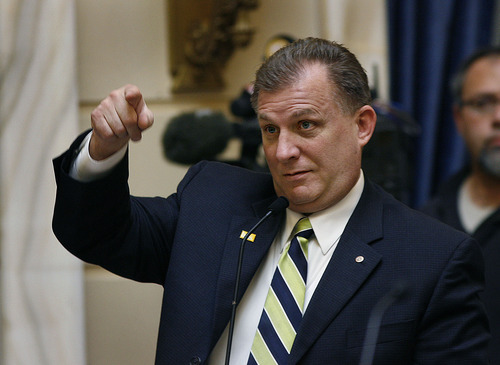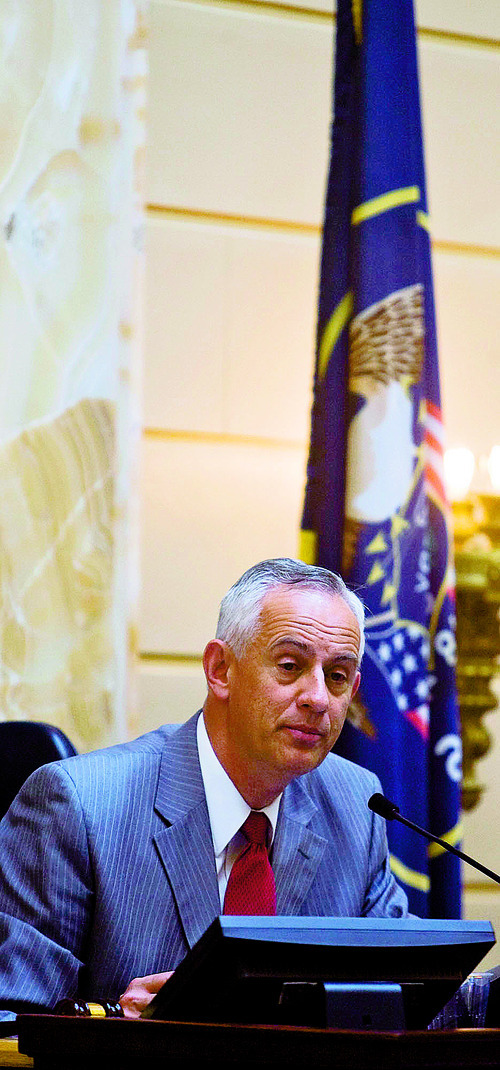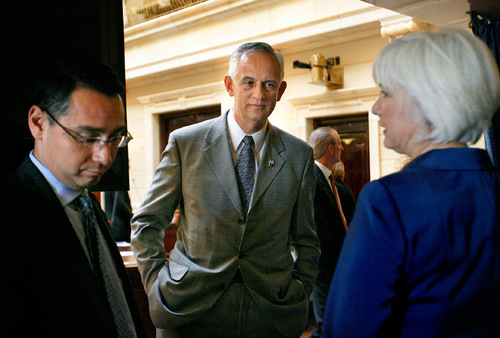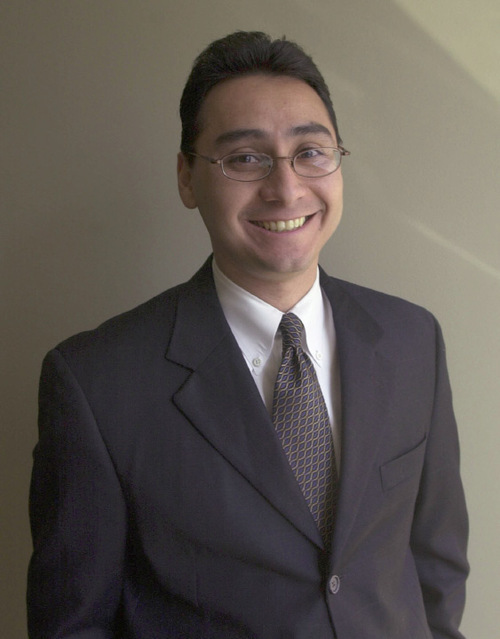This is an archived article that was published on sltrib.com in 2011, and information in the article may be outdated. It is provided only for personal research purposes and may not be reprinted.
Nine of every 10 bills that passed the Utah Legislature this year were sponsored by Republicans — which may put an exclamation mark on how much of a one-party state Utah has become.
Democrats hold 23 percent of the seats in the Legislature, but passed just 11 percent of the overall bills, according to an analysis by The Salt Lake Tribune. Still, Democratic leaders praised Republicans this year for fair treatment – noting the GOP holds three-quarters of all seats, and could steamroll almost anything it wants.
"They do listen to us," Senate Minority Leader Ross Romero, D-Salt Lake City, told a Hinckley Institute of Politics forum at the University of Utah last week.
He said it may not show in the number of bills that Democrats pass, but said his party is often able to amend Republican bills to reflect Democratic concerns. "That often times is done behind the scenes," he said, adding that GOP leaders "made sure we were included, and made sure the atmosphere was civil."
House Minority Leader David Litvack, D-Salt Lake City, added, "Sometimes the role of the minority party is to take a bad bill and make it less bad." He said Democrats helped do that on such issues as immigration. "That is the important thing to us as the minority party," he said, maybe more than passing a lot of its own bills.
Even Sen. Ben McAdams, D-Salt Lake City, who waged a loud fight against Republicans who bottled up his bill seeking to ban discrimination based on sexual orientation, said he was generally treated well. "I still passed 11 bills out of the 19 I introduced," he said. "I do feel we are treated fairly — depending on the issue."
Republicans outnumbered Democrats 80-24 in the Legislature (22-7 in the Senate, and 58-17 in the House). With that edge, Republicans had their way in almost any measure imaginable this year, including:
• Republicans sponsored 451 of the 504 bills that passed this year, or 89.5 percent of them.
• The GOP as a group passed 68 percent of the bills that it introduced. Democrats passed only 47 percent of their bills. House Democrats managed to pass only 38 percent of their bills.
• Of the 15 lawmakers who passed all of the bills they introduced, 12 were Republicans and three were Democrats.
• Of the 10 lawmakers who did not manage to pass any bills that they introduced, six were Democrats and four were Republicans. (All but two of Utah's lawmakers introduced at least one bill. The exceptions were House Speaker Becky Lockhart, R-Provo, because leaders often introduce few bills, and freshman Rep. Dean Sanpei, R-Provo.)
Senate President Michael Waddoups, R-Taylorsville, said Republicans try to include Democrats.
"We tried to work with them to get hearings on their bills, so they could work through the committee process to correct and improve their bills, as we do with ours. However, many of the bills they introduce are 'message bills' to their constituents that they don't expect to pass, so their percentages are lower," he said.
"Yet they provide an alternative voice," Waddoups said, adding that he makes no apologies for Republicans passing such a high percentage of the bills. "The majority should pass the majority of the bills," and said he feels it represents what most Utahns want.
Other findings in the analysis include showing that most bills introduced become law, that most do so in the final hours of the Legislature, and showing who the most frustrated or successful lawmakers are.
The legislature passed 504 bills and resolutions in its 45-calendar-day session, and actually met on only 33 of those days. About half of the bills — 243 — passed in the just the last four days. On the last day, 123 bills received final passage. That may raise questions about how much scrutiny bills receive.
Also, the analysis found that any bill introduced has high odds of making it into law.
This year, 782 bills and resolutions were introduced (not counting title-only "placeholder" bills that had no text). Lawmakers passed 504 of them, or 64 percent. In short, two of every three bills that were introduced passed.
Three lawmakers may be tied for being the most frustrated. Romero and Reps. Carol Moss, D-Holladay, and Joel Briscoe, D-Salt Lake City, each introduced four bills but did not pass any.
Others who did not pass any of the bills they introduced include Reps. Jackie Biskupski, D-Salt Lake City; Janice Fisher, D-West Valley City; Jim Nielson, R-Bountiful; David Butterfield, R-Logan; Holly Richardson, R-Pleasant Grove; Douglas Sagers, R-Tooele; and Mark Wheatley, D-Murray.
Sen. Curt Bramble, R-Provo, passed the most bills of any lawmaker — 24. But his percentage of passing them was only average, because he introduced 36 bills (also the most of any lawmaker, not including title-only bills without text).
Rep. Chris Herrod, R-Provo, introduced the second-most bills of any lawmaker — 22 — but managed to pass only three, for a lowly 14 percent success rate.
Ranking No. 2 behind Bramble in the number of bills passed — 16 each — were Sens. Lyle Hillyard, R-Logan, and Stuart Adams, R-Layton.
Rep. James Dunnigan, R-Taylorsville, went nine-for-nine in passing bills he introduced.
Other House members with 100 percent records for passing bills, although they introduced fewer, included Reps. Ronda Menlove, R-Garland; Todd Kiser, R-Sandy; Greg Hughes, R-Draper; Brad Last, R-Hurricane; Evan Vickers, R-Cedar City; Francis Gibson, R-Mapleton; Ken Ivory, R-West Jordan; and John Mathis, R-Vernal.
Senators who were 100 percenters included: Waddoups; Margaret Dayton, R-Orem; Majority Leader Scott Jenkins, R-Plain City; and Karen Morgan, D-Cottonwood Heights.









